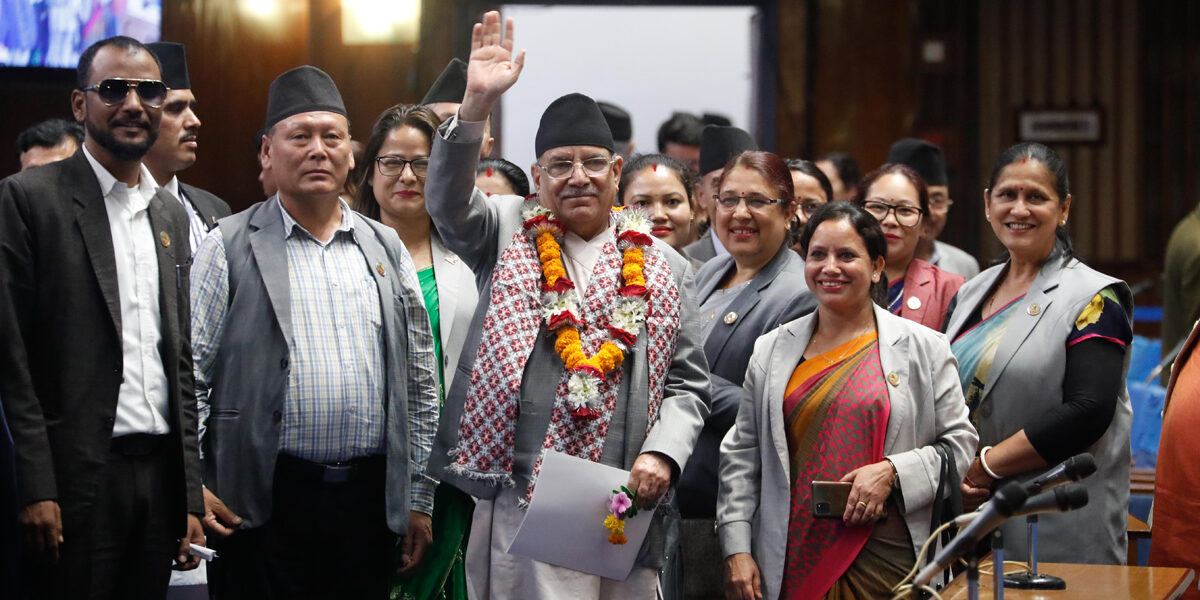KATHMANDU: Prime Minister (PM) Pushpa Kamal Dahal Prachanda found himself under mounting pressure as he secured the vote of confidence for the fourth time on Monday, with 157 votes cast in his favor.
This marks the fourth instance in just 16 months where he faced no opposition votes in Parliament.
Speaker Devraj Ghimire cnnouned that 158 MPs were present during the session, where the Nepali Congress MPs protested by encircling the well of the Parliament.
PM Dahal’s journey from nearly unanimous support in his initial term to facing current challenges is noteworthy.
His former allies, including the Nepali Congress, have now turned against him.
Nepali Congress Chief Whip Ramesh Lekhak questioned the urgency behind PM Dahal’s hasty confidence vote, three weeks before its deadline.
Once accustomed to overwhelming parliamentary support, PM Dahal now faces criticism and internal discord.
Seeking a vote of confidence, he warned Nepali Congress of consequences for obstructing parliamentary proceedings, exhibiting visible tension during the confidence vote.
NC Chief Whip, Lekhak accused PM Dahal of stifling opposition voices in Parliament and labeled Speaker Devraj Ghimire as a government puppet.
The fluctuating dynamics within Parliament, coupled with the changing allegiances of key parties, underscore the precarious nature of PM Dahal’s position.
The pressure on PM Dahal with the split of JSP and NC’s persistent siege.
Despite his attempts to defend his actions, the pressure on PM Dahal mounts, especially amidst demands for action against key figures in cooperative fraud cases.
The rift between the ruling and opposition parties deepens, particularly over the lack of progress in investigations.
Even during his fourth vote of confidence, PM Dahal faced immense pressure, evident in his parliamentary address.
His support has dwindled over time, reflecting the challenges he faces in maintaining stability.
Despite initially garnering broad support, PM Dahal’s grip on power weakens as the political landscape shifts.
Pm Dahal’s ascension to the Prime Minister’s office in 2079 BS, following the dissolution of the alliance with Nepali Congress, was a turning point.
In case of a split within the party represented by the Prime Minister or withdrawal of support from the governing party, the Prime Minister is mandated to seek a vote of confidence within 30 days.
While initially backed by a coalition of parties, including CPN-UML, his support base has gradually eroded.
The fluctuating dynamics within Parliament, coupled with the changing allegiances of key parties, underscore the precarious nature of PM Dahal’s position.
As he navigates the complexities of coalition politics, the pressure on PM Dahal continues to mount, challenging his leadership at every turn.
The Prime Minister’s recent confidence vote, mandated by Article 100(2) of the Constitution, raises questions about the stability of his leadership.
According to constitutional provisions, if the Prime Minister’s party splits or if a coalition partner withdraws support, a confidence vote must be held within 30 days.
The Janata Samajwadi Party Nepal’s withdrawal of support prompted this latest parliamentary test for Prime Minister Dahal.
Since assuming office, Prime Minister Dahal has faced this crucial vote four times.
The recent split in JSP-Nepal, led by Upendra Yadav, further complicated matters, leading to speculation about the Prime Minister’s ability to maintain a stable government.
As the political landscape continues to shift, understanding the constitutional framework behind these confidence votes is essential in evaluating the Prime Minister’s legitimacy and ability to govern effectively.
The Prime Minister secured a vote of confidence as per Clause (2) of Article 100 of the Constitution.
In case of a split within the party represented by the Prime Minister or withdrawal of support from the governing party, the Prime Minister is mandated to seek a vote of confidence within 30 days.









Comment